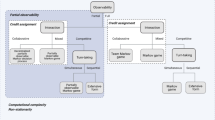Abstract
The iterated prisoner’s dilemma game has shown how cooperation evolves based on direct reciprocity. In the course of iterated interactions, a player can observe the co-player’s past actions, infer his or her strategy, and react to it. Among the above three processes, the fidelity of inference is relatively unexplored compared to the others. In this work, we explicitly construct an inference process between observation and reaction. Specifically, the focal player infers the co-player’s strategy by applying the maximum likelihood estimation to the observed sequence of actions. Our first finding is that the focal player’s inference is accurate when both players take only their last actions into consideration if the observed sequence is sufficiently long. To see the case in which inference must be inaccurate, we also set the focal player’s memory length to be shorter than the co-player’s. In this case, we choose a combination of Tit-for-tat and Anti-tit-for-tat (TA) as the co-player’s long-memory strategy. TA satisfies the following three conditions: (1) mutual cooperation is achieved when all players use the strategy, (2) the strategy exploits unconditional cooperation, and (3) a player using this strategy is not exploited repeatedly by any co-player. The short-memory player inaccurately infers TA as either Tit-for-tat, Win–Stay–Lose–Shift, or Grim trigger, depending on his or her own strategy. This work presents how a long-memory strategy is projected onto a short-memory one by inference with information loss. In addition, we suggest that each of those three well-known strategies could be a facet of a single successful strategy with a higher cognitive capacity.


Similar content being viewed by others
Change history
24 January 2024
Affiliation 2 has been corrected.
25 January 2024
An Erratum to this paper has been published: https://doi.org/10.1007/s40042-024-01015-9
References
R.L. Trivers, O. Rev. Biol. 46, 35 (1971)
M.A. Nowak, Science 314, 1560 (2006)
R. Axelrod, The Evolution of Cooperation (Basic Books, New York, 1984)
R. Axelrod, W.D. Hamiltion, Science 211, 1390 (1981)
M. Nowak, K. Sigmund, Appl. Math. Comput. 30, 191 (1989)
M. Nowak, K. Sigmund, Acta. Appl. Math. 20, 247 (1990)
M. Nowak, Theor. Popul. Biol. 38, 93 (1990)
M. Nowak, K. Sigmund, Nature 364, 56 (1993)
M.A. Nowak, K. Sigmund, E. El-Sedy, J. Math. Biol. 33, 703 (1995)
A. Traulsen, M.A. Nowak, J.M. Pacheco, Phys. Rev. E 74, 011909 (2006)
S.K. Baek, H.-C. Jeong, C. Hilbe, M.A. Nowak, Sci. Rep. 6, 1 (2016)
G. Szabó, C. Tőke, Phy. Rev. E 58, 69 (1998)
A.J. Stewart, J.B. Plotkin, Proc. Natl. Acad. Sci. USA 110, 15348 (2013)
H.H. Kelley, A.J. Stahelski, J. Exp. Soc. Psychol. 6, 401 (1970)
T. Cusson, J. Engle-Warnick, CIRANO-Scientific Publications 2013s-26 (2013)
M. Kim, J.-K. Choi, S.K. Baek, Proc. R. Soc. B 288, 20211021 (2021)
L. Wasserman, All of Statistics: A Concise Course in Statistical Inference, vol. 26 (Springer, Berlin, 2004)
S. Do Yi, S.K. Baek, J.-K. Choi, J. Theor. Biol. 412, 1 (2017)
Acknowledgements
We are thankful to Seung Ki Baek for the discussions. We were supported by Basic Science Research Program through the National Research Foundation of Korea (NRF), funded by the Ministry of Education (NRF-2020R1I1A2071670) and the Ministry of Science and ICT (NRF-2019R1A2C2089463).
Author information
Authors and Affiliations
Corresponding author
Additional information
Publisher's Note
Springer Nature remains neutral with regard to jurisdictional claims in published maps and institutional affiliations.
Rights and permissions
Springer Nature or its licensor (e.g. a society or other partner) holds exclusive rights to this article under a publishing agreement with the author(s) or other rightsholder(s); author self-archiving of the accepted manuscript version of this article is solely governed by the terms of such publishing agreement and applicable law.
About this article
Cite this article
Kim, M. Strategy inference using the maximum likelihood estimation in the iterated prisoner’s dilemma game. J. Korean Phys. Soc. 84, 102–107 (2024). https://doi.org/10.1007/s40042-023-00954-z
Received:
Revised:
Accepted:
Published:
Issue Date:
DOI: https://doi.org/10.1007/s40042-023-00954-z




